
Paulina Susana Rubio Dosamantes is a Mexican singer. She first achieved recognition as a member of the successful pop group Timbiriche from 1982 through 1991. After leaving Timbiriche, she embarked on a solo career. Referred to as the "Queen of Latin Pop", Rubio has sold over 20 million records, making her one of the best-selling Latin music artists of all-time.

Timbiriche is a Mexican pop music group. The group started as a children's group in 1982 and managed to evolve successfully into adulthood.

Romance is the eighth studio album by Mexican singer Luis Miguel. It was released by WEA Latina on 19 November 1991. Although the production was originally intended as another collaboration with Juan Carlos Calderón, that plan was scrapped when Calderón was unable to compose songs for the album. Facing a new-material deadline in his recording contract, at his manager's suggestion Miguel chose bolero music for his next project. Mexican singer-songwriter Armando Manzanero was hired by WEA Latina to co-produce the album with Miguel. Recording began in August 1991 at Ocean Way Recording in Hollywood, California, with Bebu Silvetti the arranger.

Segundo Romance is the tenth studio album by Mexican singer Luis Miguel, released on 30 August 1994 through WEA Latina. Like Miguel's 1991 album Romance, Segundo Romance comprises cover versions of boleros written between 1934 and 1993. It was produced by Miguel with Juan Carlos Calderón, Kiko Cibrian and Armando Manzanero and recorded in early 1994 at the Record Plant in Los Angeles.

24 Kilates is the second studio album by Mexican recording artist Paulina Rubio, released by Capitol Latin on November 16, 1993. Following the success of her debut album, Rubio reunited with the Spanish producer Miguel Blasco, who produced her second music project, while the songs were written mostly by Cesar Valle, Don Matamoros and C. Sánchez. The recording sessions took place in Spain during the summer of 1993, coinciding with Rubio promotion her first concert tour in South America.

La Chica Dorada is the debut solo studio album by Mexican singer Paulina Rubio, released on October 20, 1992, by EMI Latin. The album was produced and directed by Miguel Blasco, and written mostly by José Ramón Flórez, Gian Pietro Felisatti and Cesar Valle. Most of the album's composition is primarily "a light and danceable pop", although it includes some elements of pop rock, new jack swing, funk and new wave. The album's title has been stuck as Rubio's nickname throughout the Spanish-speaking world ever since.
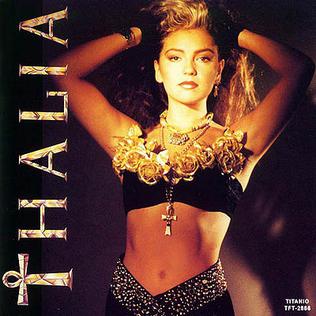
Thalía is the eponymous debut solo studio album by Mexican singer Thalía. It was produced by Alfredo Diaz Ordaz and released in Mexico on 9 October 1990, by Fonovisa Records. The album consisted of songs inspired in the 1980s rock, disco, pop, and ballads style. The first two singles "Un Pacto Entre Los Dos" and "Saliva" were highly controversial due to their suggestive lyrics, but were nonetheless highly successful, and are now considered Thalía's classics along with "Amarillo Azul" and "Pienso En Ti".
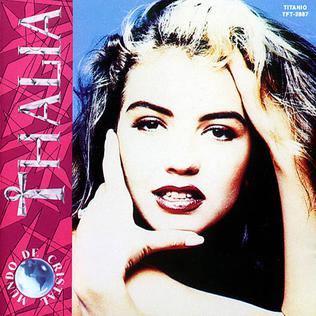
Mundo de Cristal is the second studio album by Mexican singer Thalía, released in Mexico on 26 September 1991, by Fonovisa Records. It was Thalía's second and last album to be produced by Alfredo Díaz Ordaz, who was her boyfriend at that time and died of hepatitis in 1993. Mundo de Cristal was certified 2× Gold in Mexico for shipments of 200,000 units. The most successful singles from the album were "Sudor", "En La Intimidad" and "Fuego Cruzado". To celebrate Thalía's 25th anniversary as a solo artist, this album is available in the digital platforms iTunes and Spotify since December 2014.

Mexican singer-songwriter Paulina Rubio has released eleven studio albums, fifteen compilation albums, 62 singles, ten promotional singles, and has made some eleven guest appearances. In 1992, Rubio signed a recording contract with record label Capitol Latin in order to launch her career as a solo artist, after recording ten albums with Timbiriche between 1982 and 1990.

Aries is the ninth studio album by Mexican recording artist Luis Miguel. It was released by WEA Latina on 22 June 1993. After attaining commercial success in 1991 with his previous album, Romance, Luis Miguel decided to return to a style similar to his earlier work, featuring pop ballads and dance numbers with R&B influences. The record was produced by Luis Miguel, who was assisted by Kiko Cibrian, Rudy Pérez, David Foster, and Juan Luis Guerra.
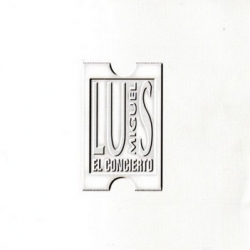
El Concierto is the second live album by Mexican recording artist Luis Miguel, released on 17 October 1995 by WEA Latina. It was recorded from his performances at the National Auditorium in Mexico and at the José Amalfitani Stadium in 1994 during his Segundo Romance Tour. The album features live covers of José Alfredo Jiménez's songs, which were previously unreleased. The first two songs were released as singles, the former reaching number one on the Billboard Hot Latin Songs chart and the latter peaking at number three on the same chart.

Timbiriche VII is the seventh studio album by Mexican pop group Timbiriche, released on June 29, 1987, by Fonovisa Records. This album marked the beginning of Thalía Sodi's participation in the group and in the same year she also appeared on the Televisa production, Quinceañera.

La Banda Timbiriche: En Concierto or simply En Concierto is the third album from Mexican pop music group Timbiriche. It was released in 1983.

Timbiriche Vaselina is the 5th album from Mexican pop music Group Timbiriche. It was released on 1984. Based on the Musical Grease (musical). Presented by Luis De Llano, Produced by Julissa.

Timbiriche X is the tenth album released by Mexican pop and rock band Timbiriche. The first single "Me Pongo Mal" was released in late 1989 and by the time the full album debuted in April 1990, the single was at the top of the charts.

Timbiriche VIII & IX is the eighth and ninth studio album by Mexican pop group Timbiriche, released on May 7, 1988, by Fonovisa Records. It was the first album that Edith Márquez recorded with the group after Mariana Garza left to start a solo career, and the last for Alix Bauer, Eduardo Capetillo and Thalía Sodi. In 1989, the album was certified Platinum, it sold over one million copies in Mexico.

"Saliva" is a song by Mexican singer Thalía from her self titled debut solo album. It was released by Melody/Fonovisa as the album's second single in 1990. The music caused controversy due to the lyrics of a sexual nature and was banned from some Mexican radio stations.
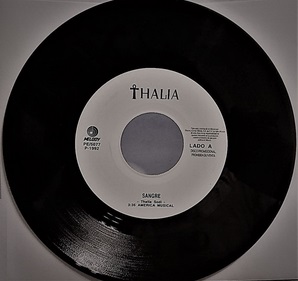
"Sangre" is the first single taken from the album Love by Mexican singer Thalía. The song was composed by the singer herself and the lyrics are dedicated to Alfredo Díaz Ordáz who died before the album was released. The song was successful in Mexico peaking at number two in the Notitas Musicales chart. "Sangre" is the third of four songs in which Thalía talks about body fluids, the others are "Saliva", "Sudor" and "Lágrimas" from the albums Thalía, Mundo de Cristal and En éxtasis, respectively.
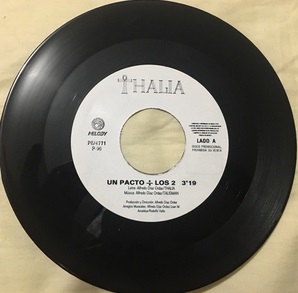
"Un Pacto Entre los Dos" is a song by Mexican singer Thalía from her self titled debut solo album. It was released by Melody/Fonovisa as the album's first single and despite the controversy caused by its lyrics, it managed to be successful on the Mexican charts.
"Ven Junto a Mi" is a written and performed by Mexican singer Claudio Bermúdez on his 1994 debut album Como Aire Fresco The album marked his career as a soloist following his departure from Timbiriche in 1991. It was produced by Spanish composer Rafael Pérez-Botija and released as a single in 1994. The song became a number one hit on the Billboard Latin Pop Airplay chart in 1995 where it spent seven weeks on top of the chart. It was recognized as one of best-performing songs of the year at the 1996 ASCAP Latin Awards. Despite its success, it became his only number one song on the chart and Bermúdez later became a composer and record producer for other artists. The song has been covered by Victor Roque y su Gran Manzana, Johnny Rivera, and Encadenado.



















